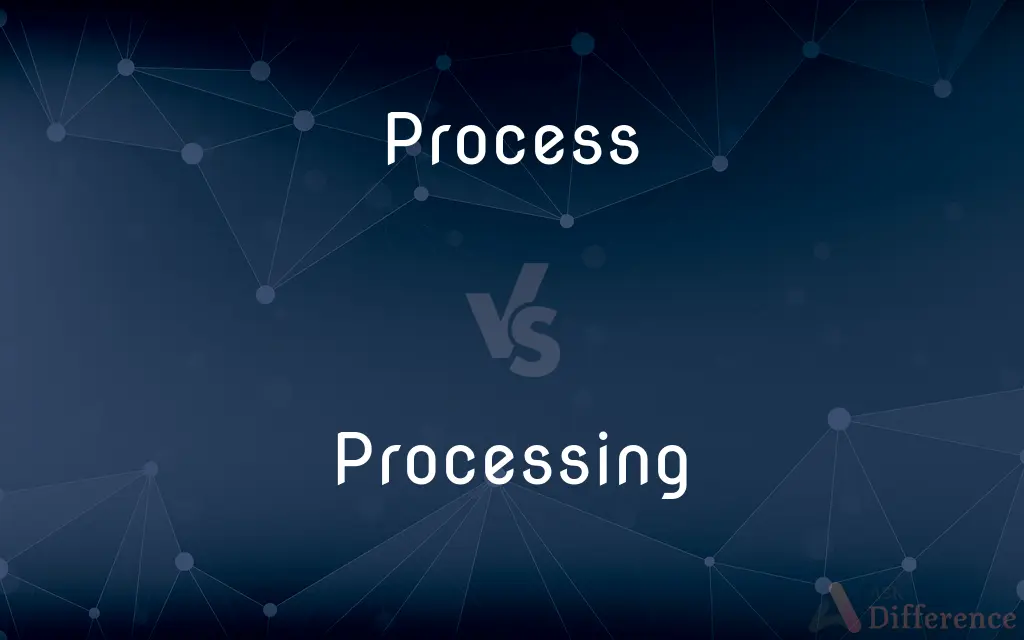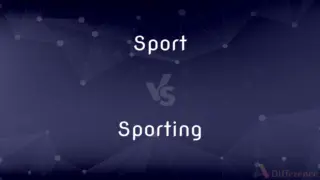Process vs. Processing — What's the Difference?
Edited by Tayyaba Rehman — By Fiza Rafique — Updated on March 26, 2024
Process refers to a series of actions or steps taken to achieve a particular end, while processing signifies the act of performing a process, especially in the context of handling information or materials.

Difference Between Process and Processing
Table of Contents
ADVERTISEMENT
Key Differences
A process is a systematic series of actions directed towards achieving a specific goal or outcome. It can apply to various fields, from manufacturing to cognitive thought patterns. Whereas processing involves the execution or carrying out of these steps, often implying a dynamic or ongoing action. This distinction highlights the conceptual versus the active or operational nature of these terms.
Process often outlines a theoretical or planned sequence of events or stages. For example, the process of photosynthesis in plants describes the steps they use to convert light into energy. On the other hand, processing might refer to the actual enactment of these steps, such as when a computer processes data, transforming input into output in real-time.
In business, a process might refer to a set of prescribed steps designed to achieve a company objective, such as the hiring process. Whereas processing in this context could involve the actual review and handling of applications by a human resources department, indicating the practical application of the steps outlined in the process.
In the context of technology, a process may describe the theoretical underpinnings of a computer operation, like the process of data encryption. Processing, however, refers to the computer actively encoding the data, showcasing the difference between a concept and its application.
In psychology, a process might describe the framework or steps of cognitive development or therapy, such as the grieving process. Processing in this field refers to an individual actively working through the emotions or thoughts outlined in these psychological processes, emphasizing the personal experience of moving through the steps.
ADVERTISEMENT
Comparison Chart
Definition
A series of steps designed to achieve an outcome
The act of performing or executing these steps
Context
Theoretical or planned sequence
Practical application or enactment
Fields of Application
Can apply to any field (e.g., manufacturing, psychology)
Often used in information technology, data handling
Temporality
Can be a one-time blueprint or recurring
Suggests ongoing action or operation
Example
The process of digestion outlines steps from ingestion to nutrient absorption
Processing food involves the physical breakdown and chemical transformation of food into energy
Compare with Definitions
Process
A natural occurrence marked by gradual changes that lead towards a particular result.
The erosion process shapes landscapes over centuries.
Processing
The method of dealing with something according to a procedure.
Processing insurance claims involves verifying the claim details and assessing the damage.
Process
A methodical or established way of doing something.
The recruitment process ensures that only the most qualified candidates are hired.
Processing
Preparing or treating food for consumption or storage.
Processing fruits involves cleaning, cutting, and sometimes packaging them for sale.
Process
A series of operations performed in the making or treatment of a product.
The manufacturing process of cars includes assembly, painting, and inspection.
Processing
The act of considering or taking in information.
Processing a traumatic event can take time and often requires professional support.
Process
The proceedings in a court of law.
The legal process can be lengthy and complex, involving multiple steps and procedures.
Processing
The handling and manipulation of data by a computer.
Modern computers are capable of processing millions of instructions per second.
Process
A series of actions, changes, or functions bringing about a result
The process of digestion.
The process of obtaining a driver's license.
Processing
Performing a series of mechanical or chemical operations on (something) in order to change or preserve it.
Processing raw materials into usable forms requires extensive resources.
Process
A sequence of actions or steps taken to achieve an end.
The scientific method is a process that involves observation, hypothesis, experimentation, and conclusion.
Processing
A series of actions, changes, or functions bringing about a result
The process of digestion.
The process of obtaining a driver's license.
Process
A series of operations performed in the making or treatment of a product
A manufacturing process.
Leather dyed during the tanning process.
Processing
A series of operations performed in the making or treatment of a product
A manufacturing process.
Leather dyed during the tanning process.
Process
Progress; passage
The process of time.
Events now in process.
Processing
Progress; passage
The process of time.
Events now in process.
Process
The use of the law courts and other fora as a means of seeking redress
The adversarial process.
Due process of law.
Processing
The use of the law courts and other fora as a means of seeking redress
The adversarial process.
Due process of law.
Process
The set of actions and events that constitute a legal proceeding or a significant portion thereof
The trial process.
The sentencing process.
Processing
The set of actions and events that constitute a legal proceeding or a significant portion thereof
The trial process.
The sentencing process.
Process
(Law) A means of compelling a person to appear in court, especially a summons ordering a defendant to appear in court.
Processing
(Law) A means of compelling a person to appear in court, especially a summons ordering a defendant to appear in court.
Process
(Biology) An outgrowth of tissue; a projecting part
A bony process.
Processing
(Biology) An outgrowth of tissue; a projecting part
A bony process.
Process
Any of various photomechanical or photoengraving methods.
Processing
Any of various photomechanical or photoengraving methods.
Process
A running software program or other computing operation.
Processing
A running software program or other computing operation.
Process
A part of a running software program or other computing operation that does a single task.
Processing
A part of a running software program or other computing operation that does a single task.
Process
See conk3.
Processing
See conk3.
Process
To put through the steps of a prescribed procedure
Processing newly arrived immigrants.
Process an order.
Processing
To put through the steps of a prescribed procedure
Processing newly arrived immigrants.
Process an order.
Process
To prepare, treat, or convert by subjecting to a special process
Process ore to obtain minerals.
Processing
To prepare, treat, or convert by subjecting to a special process
Process ore to obtain minerals.
Process
(Computers) To perform operations on (data).
Processing
(Computers) To perform operations on (data).
Process
To gain an understanding or acceptance of; come to terms with
Processed the traumatic event in therapy.
Processing
To gain an understanding or acceptance of; come to terms with
Processed the traumatic event in therapy.
Process
To straighten (hair) by a chemical process; conk.
Processing
To straighten (hair) by a chemical process; conk.
Process
To move along in a procession
"The man in the panama hat offered his arm and ... they processed into the dining room" (Anita Brookner).
Processing
To move along in a procession
"The man in the panama hat offered his arm and ... they processed into the dining room" (Anita Brookner).
Process
Prepared or converted by a special process
Process cheese.
Processing
Prepared or converted by a special process
Process cheese.
Process
Made by or used in any of several photomechanical or photoengraving processes
A process print.
Processing
Made by or used in any of several photomechanical or photoengraving processes
A process print.
Process
A series of events which produce a result (the product).
This product of last month's quality standards committee is quite good, even though the process was flawed.
Processing
The action of the verb to process.
Process
(manufacturing) A set of procedures used to produce a product, most commonly in the food and chemical industries.
Processing
The act of taking something through a set of prescribed procedures.
Process
A path of succession of states through which a system passes.
Processing
The act of retrieving, storing, classifying, manipulating, transmitting etc. data, especially via computer techniques.
Process
(anatomy) Successive physiological responses to keep or restore health.
Processing
Present participle of process
Process
(legal) Documents issued by a court in the course of a lawsuit or action at law, such as a summons, mandate, or writ.
Processing
Preparing or putting through a prescribed procedure;
The processing of newly arrived immigrants
The processing of ore to obtain minerals
Process
(biology) An outgrowth of tissue or cell.
Process
(anatomy) A structure that arises above a surface.
Process
(computing) An executable task or program.
Process
The centre mark that players aim at in the game of squails.
Process
(transitive) To perform a particular process on a thing.
Process
(transitive) To retrieve, store, classify, manipulate, transmit etc. (data, signals, etc.), especially using computer techniques.
We have processed the data using our proven techniques, and have come to the following conclusions.
Process
To think about a piece of information, or a concept, in order to assimilate it, and perhaps accept it in a modified state.
I didn't know she had a criminal record. That will take me a while to process.
Process
To develop photographic film.
Process
To take legal proceedings against.
Process
To walk in a procession
Process
The act of proceeding; continued forward movement; procedure; progress; advance.
The thoughts of men are widened with the process of the suns.
Process
A series of actions, motions, or occurrences; progressive act or transaction; continuous operation; normal or actual course or procedure; regular proceeding; as, the process of vegetation or decomposition; a chemical process; processes of nature.
Tell her the process of Antonio's end.
Process
A statement of events; a narrative.
Process
Any marked prominence or projecting part, especially of a bone; anapophysis.
Process
The whole course of proceedings in a cause real or personal, civil or criminal, from the beginning to the end of the suit; strictly, the means used for bringing the defendant into court to answer to the action; - a generic term for writs of the class called judicial.
Process
A particular course of action intended to achieve a result;
The procedure of obtaining a driver's license
It was a process of trial and error
Process
A sustained phenomenon or one marked by gradual changes through a series of states;
Events now in process
The process of calcification begins later for boys than for girls
Process
(psychology) the performance of some composite cognitive activity; an operation that affects mental contents;
The process of thinking
The cognitive operation of remembering
Process
A writ issued by authority of law; usually compels the defendant's attendance in a civil suit; failure to appear results in a default judgment against the defendant
Process
A mental process that you are not directly aware of;
The process of denial
Process
A natural prolongation or projection from a part of an organism either animal or plant;
A bony process
Process
Deal with in a routine way;
I'll handle that one
Process a loan
Process the applicants
Process
Subject to a process or treatment, with the aim of readying for some purpose, improving, or remedying a condition;
Process cheese
Process hair
Treat the water so it can be drunk
Treat the lawn with chemicals
Treat an oil spill
Process
Perform mathematical and logical operations on (data) according to programmed instructions in order to obtain the required information;
The results of the elections were still being processed when he gave his acceptance speech
Process
Institute legal proceedings against; file a suit against;
He was warned that the district attorney would process him
She actioned the company for discrimination
Process
Shape, form, or improve a material;
Work stone into tools
Process iron
Work the metal
Process
Deliver a warrant or summons to someone;
He was processed by the sheriff
Process
March in a procession;
They processed into the dining room
Common Curiosities
How does technology affect processing?
Technology can significantly speed up processing, automate repetitive tasks, and enable more complex processes to be executed.
Can processing occur without a defined process?
Generally, processing implies following a defined process, though the level of formality can vary.
Why is understanding both process and processing important in business?
Understanding both allows for the efficient planning and execution of tasks, leading to improved productivity and outcomes.
Can the term processing apply to mental activities?
Yes, processing can refer to the way individuals think through or emotionally deal with information or experiences.
How do processes evolve over time?
Processes can evolve through optimization, technological advances, or changes in best practices.
What role does feedback play in processing?
Feedback can be crucial for adjusting and improving the processing steps to achieve better results.
What is the difference between process and processing?
Process refers to a sequence of actions designed to achieve a result, while processing is the act of carrying out these actions.
Is a process always linear?
Not necessarily; some processes can be cyclical or iterative, especially in creative or analytical fields.
How can processes be optimized?
Processes can be optimized by streamlining steps, integrating technology, and eliminating inefficiencies.
Is processing always a deliberate action?
While processing is generally deliberate, some forms, like subconscious thought processing, can occur without conscious effort.
How does digital processing differ from manual processing?
Digital processing is performed by computers and is typically faster and more accurate, while manual processing involves human intervention and is slower and prone to error.
Why is real-time processing important?
Real-time processing is crucial for tasks that require immediate action or feedback, such as financial transactions or emergency responses.
What is batch processing?
Batch processing refers to processing large volumes of data or materials at once, rather than in real-time.
Can processes be proprietary?
Yes, businesses often develop proprietary processes to gain a competitive advantage.
How are processes documented?
Processes are often documented in manuals, flowcharts, or using process management software.
Share Your Discovery

Previous Comparison
Sport vs. Sporting
Next Comparison
Reseller vs. RetailerAuthor Spotlight
Written by
Fiza RafiqueFiza Rafique is a skilled content writer at AskDifference.com, where she meticulously refines and enhances written pieces. Drawing from her vast editorial expertise, Fiza ensures clarity, accuracy, and precision in every article. Passionate about language, she continually seeks to elevate the quality of content for readers worldwide.
Edited by
Tayyaba RehmanTayyaba Rehman is a distinguished writer, currently serving as a primary contributor to askdifference.com. As a researcher in semantics and etymology, Tayyaba's passion for the complexity of languages and their distinctions has found a perfect home on the platform. Tayyaba delves into the intricacies of language, distinguishing between commonly confused words and phrases, thereby providing clarity for readers worldwide.
















































